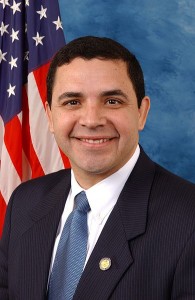CUELLAR SPONSORS LEGISLATION TO CUT SPENDING, REDUCE DEFICIT
Written by Post Public Information Representative, Mar 16, 2011, 0 Comments
Bill would bring ‘expedited rescission’ on budget vote
Washington, D.C. – Congressman Henry Cuellar (TX-28) announced introduction of the Reduce Unnecessary Spending Act, a bill that will give Congress and the President important tools to cut wasteful spending and save taxpayer dollars.
The Reduce Unnecessary Spending Act, H.R. 1043, is commonly referred to as a modified line-item veto. It gives the President and Congress the authority to identify and vote to cut specific provisions or earmarks included in larger pieces of legislation. Also known as “expedited rescission,” this proposal has bipartisan support and is a common sense tool to budget enforcement. Congressman Cuellar and the Blue Dog coalition introduced this legislation on March 11, 2011, and are original sponsors of today’s legislation.
“The American people know that we need to cut wasteful, inefficient spending in order to restore fiscal responsibility and grow our economy,” Congressman Cuellar said. “With the authority to make specific cuts, we can eliminate wasteful projects such as the ‘Bridge to Nowhere’ without voting down the entire legislation. This requires legislative and executive cooperation and is a smart, responsible approach to reduce spending.”
Specifically, H.R. 1043 ensures timely congressional consideration of cuts to non-entitlement spending when requested by the President. It preserves Congress’ constitutional prerogative by requiring that both the House of Representatives and the Senate approve a rescission request before it can become law. The bill also requires the President to submit the requests to Congress within 45 calendar days of signing the initial spending bill into law. Any savings from Congressional passage of a rescission approval will immediately go to deficit reduction.
Background:
The proposal was originally introduced by Congress on May 24, 2010, during the 111th Congress by former Chairman of the House Budget Committee. This bill is now being proposed as a Blue Dog endorsed initiative in the 112th Congress by Congressman Chris Van Hollen, Ranking Member on the House Budget Committee. The Senate has a similar bill, S. 102, which has 33 bipartisan co-sponsors.
Expedited rescission, or the line-item veto, was passed in the House of Representatives with bipartisan support in the early 1990s. In 1992, 1993, and 1994, the House of Representatives passed an expedited rescission bill each year. More recently, in the 109th Congress, the House of Representatives passed the Legislative Line Item Veto Act, on June 22, 2006. In comments accompanying the proposal it is asserted that “the President’s proposal is fully consistent with the Constitution.”
In 1998, the Supreme Court ruled in Clinton v. City of New York to strike down the Line Item Veto Act of 1996. The Supreme Court concluded the Act gave the President unilateral power to change the text of duly enacted statutes.
According to constitutional scholars, the Legislative Line Item Veto Act does not raise those constitutional issues because the President’s rescission proposals must be enacted by both Houses and signed into law. The expedited rescission approach has attracted support over the years.




